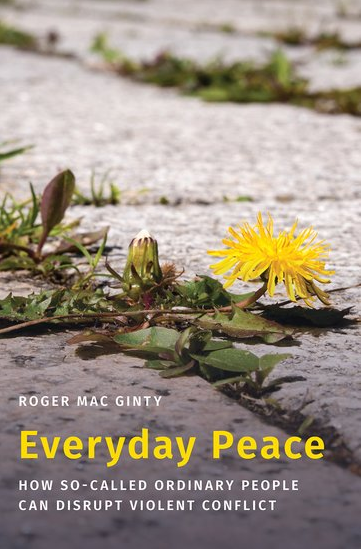My Book – Everyday Peace: How so-called ordinary people can disrupt violent conflict – is published by Oxford University Press on 17 June 2021. Details here: https://global.oup.com/academic/product/everyday-peace-9780197563397?cc=us&lang=en

Lots of people helped in the writing of the book and I am very glad to acknowledge them here by reprinting the Acknowledgements from the book:
Completion of this manuscript is about seven years late, a fact not unrelated to having a seven year old daughter, Flora. The book is dedicated to my brother, Manus Mac Ginty, who died much too young. He loved his family, the outdoors, and storytelling. I miss him very much.
Many debts were incurred in writing this book. Alex Bellamy, John Brewer, Nemanja Džuverović, Pamina Firchow, Martha Henry, Laura Mcleod, Eric Lepp, Ben Rampton, Oliver Richmond, Tom Rodwell, and Mandy Turner all read sections of the book or provided help with literature. Conversations with Tatsushi Arai, Christine Bell, Morten Bøås, Roddy Brett, Kris Brown, Christine Cheng, David Ellery, Landon Hancock, Chip Hauss, Sung Yong Lee, Alp Özerdem, Michelle Parlevliet, Jan Pospisil, Gearoid Miller, Sarah Njeri, Stefano Ruzza, Elena Stavrevska, Anthony Wanis St. John, Gëzim Visoka, Birte Vogel, Andrew Williams and Susan Woodward also helped clarify thinking and provided encouragement. At Durham, a ‘Conflict +’ seminar spent an invaluable few hours discussing chapter 6 – thanks are due to Emil Archambault, Olga Demetriou, Elisabeth Kirtslogou, and Nayanika Mookherjee. Alex De Waal provided access to African Union data on security incidents.
Much of the stimulus for this book came from the Everyday Peace Indicators project, and I have been fortunate to work alongside the indefatigable Pamina Firchow for many years. I have been privileged to learn from Everyday Peace Indicators colleagues Peter Dixon, Naomi Levy, Lindsay McClain Opiyo, Jessica Smith, and Zach Tilton. The Carnegie Corporation of New York has provided patient and generous support to the Everyday Peace Indicators project and I am particularly grateful to Aaron Stanley and Stephen Del Rosso. I also acknowledge support from the Economic and Social Research Council in the form of a grant to work on peacekeeping data.
Ideas in the book were honed at papers given at the universities of Amsterdam, the Arctic, Belgrade, Bradford, Bristol, Durham, George Mason, Kent State, King’s College London, Leeds Beckett, Queen Mary, Manitoba, Newcastle, Notre Dame, St. Andrews, Turin, and York. I am grateful for the hospitality and the questions.
I benefited enormously from the encouragement and advice from the editors of the Oxford University Press series ‘Studies in Strategic Peacemaking’ – Scott Appleby, John Paul Lederach and Daniel Philpott, all at the Kroc Institute for International Peace Studies at the University of Notre Dame. At Oxford University Press I am very grateful to David McBride and Holly Mitchell for their guidance. The anonymous reviewers managed to perfect the balance between encouragement and gently pointing out the holes in the argument.
I am also grateful to the community I live in and the distractions it provides. I appointed myself ‘writer in residence’ in the café bus at the Chain Bridge Honey farm. Not a word of this book could have been written without the support of Mrs Mac Ginty. Everyone needs a Mrs Mac Ginty. Thanks are also due to Patrick, Edward and Elisabeth Mac Ginty.
This is the book I wanted to write and I am grateful for having the opportunity to do so.
